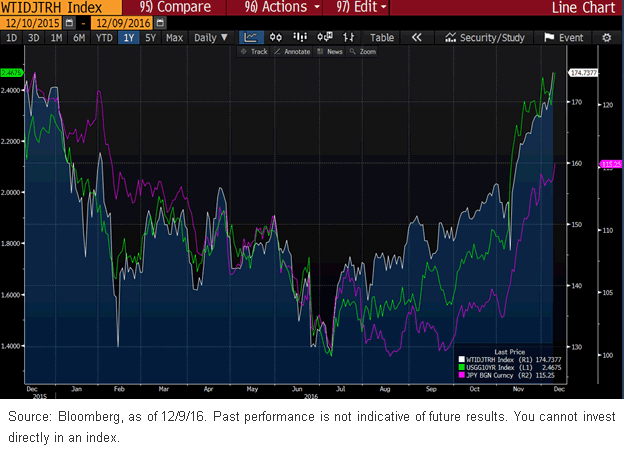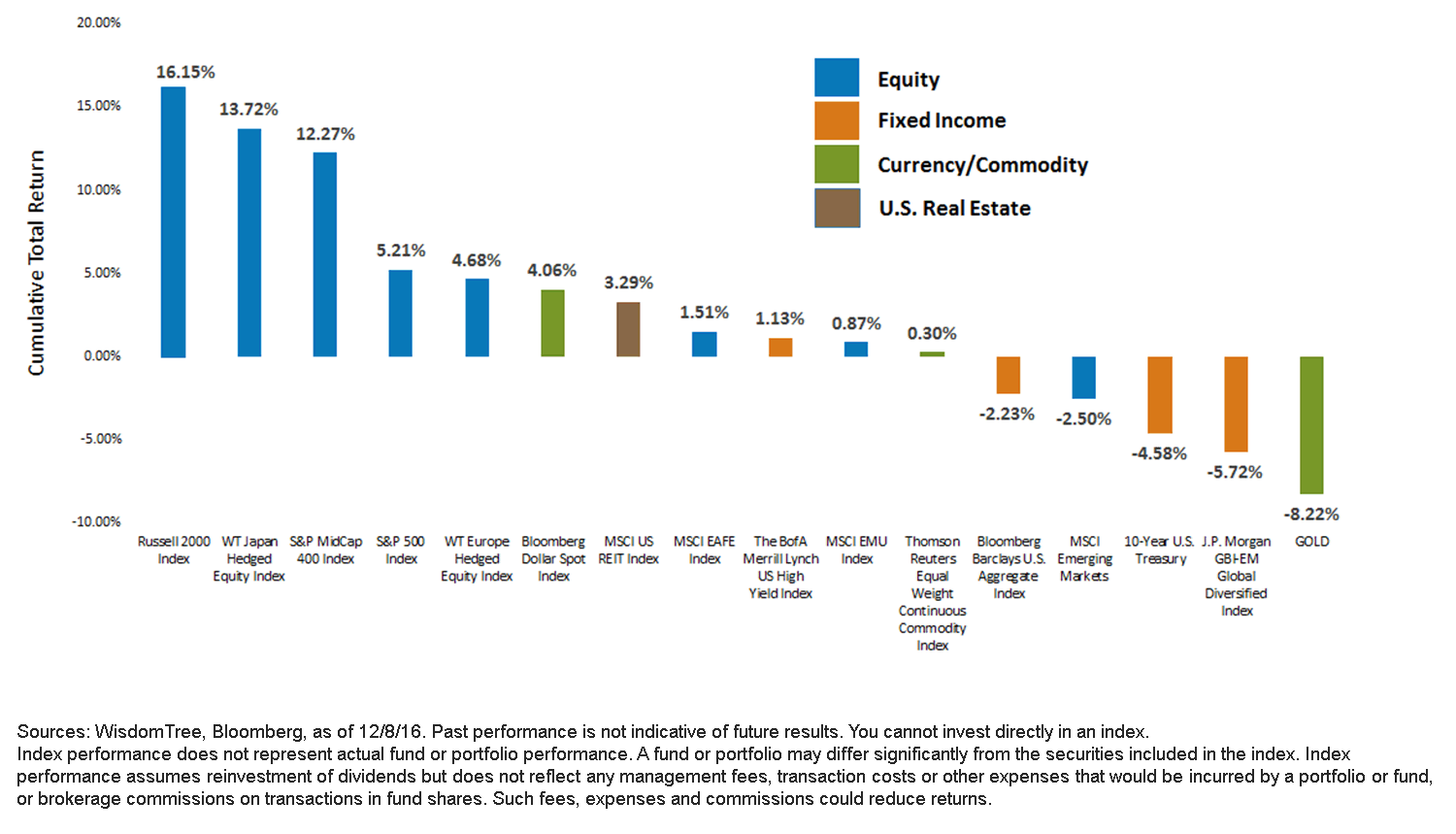The Fed Hikes Rates: What's Next for Stocks?


The Federal Reserve’s (Fed) decision to raise its policy rate for the first time in a year has been baked into the market for some time. Questions for 2017 will be, how fast does the Fed raise rates from here, and at what point do investors need to begin worrying about the Fed inverting the yield curve? My best guess is that will not be a concern in 2017, as expectations for faster gross domestic product (GDP) growth and a pickup in inflation are likely to keep longer-dated rates higher than they have been for the past few years. This, I believe, will continue to create a benign environment for stocks to levitate higher.
Three of my favorite equity asset classes for the year ahead continue to be Japan and U.S. small and mid-caps.
As shown in the chart below, the Japanese yen has been extraordinarily sensitive to the direction of 10-Year U.S. Treasury yields. As yields have headed higher (green), the yen (magenta) has weakened, depreciating from 100 to 115 compared to the dollar. And as rates have risen and the yen has weakened, the WisdomTree Japan Hedged Equity Index has moved in lock step with rising U.S. interest rates. Although the Index is roughly flat for the year, it is up 37% since interest rates bottomed July 8. In fact, the WisdomTree Japan Hedged Equity Index is up more than any of the sectors of the S&P 500 over that period.(Visit the WisdomTree Japan Hedged Equity Index page for standardized performance.)

Here in the U.S., mid- and small-cap stocks have led the market rally since November 8 and have outperformed most of the major asset classes as shown below. Given the large outperformance of mid- and small-cap companies, is this an area of the market that investors should continue to focus on in 2017? I believe it is, if one can manage for the valuation risk of buying into these asset classes after 2016's large run-up.
One of the ways to do this is by using exchange-traded funds (ETFs) whose underlying indexes rebalance equity markets back to a measure of relative value. WisdomTree does this in both its dividend-weighted and earnings-weighted Indexes.
For example, when WisdomTree rebalances the WisdomTree SmallCap Earnings Index and the WisdomTree MidCap Earnings Index each December, the price to earnings (P/E) (both trailing and forward) ratio for the Indexes is typically lowered relative to where it was before the rebalance and relative to comparable cap-weighted Indexes. That means those who invest in their tracking ETFs, the WisdomTree SmallCap Earnings Fund (EES) and the WisdomTree MidCap Earnings Fund (EZM), may have an opportunity to buy into the small- and mid-cap space at a more reasonable market multiple while still gaining broad exposure to the asset class. Moreover, because both Indexes include only profitable companies at the annual rebalance and weight components based on the earnings they’ve generated, the two WisdomTree ETFs tracking these Indexes may benefit from cuts in corporate tax rates more than other small-cap indexes that include a greater percentage of unprofitable companies. For example, around 20% of the weight of the Russell 2000 Index is typically in companies that generate no profits.
Cumulative Total Return Since Presidential Election
November 8—December 8

For definitions of indexes in the chart, visit our glossary.
Conclusion
With the investment landscape looking very different from a year ago, it may be time for investors to shift portfolios and rebalance accordingly. I believe key differentiators for this decision-making process are rising interest rates, GDP growth expectations and domestic tax cut expectations, meaning, in my view, potentially tilting toward Japanese hedged equities and U.S. small and mid-caps. For Japanese hedged equities, WisdomTree offers the WisdomTree Japan Hedged Equity Fund (DXJ).1 And for U.S. small and mid-caps, fresh off an earnings weighted rebalance that becomes effective December 19, WisdomTree offers the WisdomTree SmallCap Earnings Fund (EES) and the WisdomTree MidCap Earnings Fund (EZM).
Important Risks Related to this Article
There are risks associated with investing, including possible loss of principal. Funds focusing their investments on certain sectors and/or smaller companies increase their vulnerability to any single economic or regulatory development. This may result in greater share price volatility.Foreign investing involves special risks, such as risk of loss from currency fluctuation or political or economic uncertainty. DXJ focuses its investments in Japan, thereby increasing the impact of events and developments in Japan that can adversely affect performance. Investments in currency involve additional special risks, such as credit risk, interest rate fluctuations, derivative investments which can be volatile and may be less liquid than other securities, and more sensitive to the effect of varied economic conditions. As this Fund can have a high concentration in some issuers, the Fund can be adversely impacted by changes affecting those issuers.
Due to the investment strategy of these Funds they may make higher capital gain distributions than other ETFs. Please read each Fund’s prospectus for specific details regarding each Fund’s risk profile.


